
Israel’s energy policy plays a crucial role in ensuring the country’s energy security and economic growth. As a small nation with limited natural resources, Israel has had to rely heavily on imports to meet its energy needs in the past. However, in recent years, the discovery of significant natural gas reserves off its coast has transformed the country’s energy landscape.
The Israeli government has implemented a comprehensive energy policy that aims to diversify the country’s energy sources, reduce dependence on imported fuels, and promote the use of cleaner and more sustainable energy options. This policy has been instrumental in leveraging Israel’s natural gas reserves to meet its growing energy demands and enhance its energy security.
Overview of Natural Gas Reserves in Israel
Israel’s natural gas reserves are located primarily in the Eastern Mediterranean Basin, off its coast. The largest natural gas field discovered to date is the Leviathan field, which holds an estimated 22 trillion cubic feet (tcf) of natural gas. Other significant fields include Tamar, with approximately 11 tcf of natural gas, and Karish and Tanin, with a combined estimated reserve of 3 tcf.
These reserves have positioned Israel as a potential regional energy hub, with the capacity to export natural gas to neighboring countries. The discovery of these reserves has also reduced Israel’s dependence on imported fuels, particularly coal and oil, which were previously the main sources of energy for the country.
The Benefits of Natural Gas as an Energy Source
Natural gas offers several advantages over other fossil fuels, making it an attractive option for Israel’s energy needs. Firstly, natural gas is a cleaner-burning fuel compared to coal and oil. It emits significantly lower levels of greenhouse gases and air pollutants such as sulfur dioxide and nitrogen oxides. This makes natural gas a more environmentally friendly choice and helps reduce air pollution and mitigate climate change.
Secondly, natural gas is a more efficient fuel source. It has a higher energy density, meaning that it produces more energy per unit of volume compared to other fossil fuels. This makes natural gas a cost-effective option for power generation and other energy-intensive industries.
Lastly, natural gas is abundant and domestically available in Israel, reducing the country’s dependence on imported fuels. This enhances energy security and reduces vulnerability to fluctuations in global oil and gas prices.
Natural Gas in Israel’s Power Generation Sector
The use of natural gas in Israel’s power generation sector has increased significantly in recent years. Natural gas-fired power plants now account for a substantial portion of the country’s electricity generation capacity. This shift has been driven by the availability of domestic natural gas reserves and the government’s efforts to diversify the energy mix.
The use of natural gas in power generation has several benefits. Firstly, natural gas-fired power plants are more efficient than coal-fired plants, resulting in lower fuel consumption and reduced greenhouse gas emissions. Secondly, natural gas is a reliable and flexible fuel source, allowing for quick ramping up or down of power generation to meet fluctuating electricity demand.
The increased use of natural gas in power generation has also had a positive impact on electricity prices in Israel. Natural gas is generally cheaper than imported coal and oil, leading to lower production costs for electricity. This has helped stabilize electricity prices and reduce the burden on consumers.
The Role of Natural Gas in Reducing Israel’s Carbon Footprint
The use of natural gas has played a significant role in reducing Israel’s carbon footprint. Natural gas emits approximately 50% less carbon dioxide (CO2) than coal when burned for electricity generation. By replacing coal-fired power plants with natural gas-fired ones, Israel has been able to significantly reduce its greenhouse gas emissions.
According to the International Energy Agency (IEA), Israel’s per capita CO2 emissions have decreased by around 20% since 2005, largely due to the increased use of natural gas. This reduction in emissions has helped Israel meet its international climate commitments and contribute to global efforts to mitigate climate change.
Furthermore, Israel’s carbon footprint is relatively low compared to other countries. According to data from the World Bank, Israel’s CO2 emissions per capita are significantly lower than the global average and those of other developed countries such as the United States and Australia. This is largely attributed to the country’s reliance on natural gas for power generation.
Natural Gas in Israel’s Transportation Sector
In addition to power generation, natural gas is also being used as a fuel source in Israel’s transportation sector. Natural gas vehicles (NGVs) offer several advantages over traditional gasoline and diesel vehicles, making them an attractive option for reducing emissions and improving air quality.
NGVs emit significantly lower levels of air pollutants such as nitrogen oxides and particulate matter compared to gasoline and diesel vehicles. They also produce fewer greenhouse gas emissions, contributing to efforts to mitigate climate change.
The Israeli government has been actively promoting the use of NGVs by providing incentives such as tax breaks and subsidies for the purchase of natural gas-powered vehicles. As a result, the number of NGVs in Israel has been steadily increasing, with a growing network of natural gas refueling stations across the country.
Natural Gas Exportation and Economic Benefits
Israel’s natural gas reserves have opened up opportunities for exportation, providing significant economic benefits for the country. The government has signed agreements with neighboring countries such as Egypt and Jordan to export natural gas, helping to strengthen regional cooperation and enhance energy security in the region.
The exportation of natural gas has also boosted Israel’s economy by creating jobs and attracting foreign investment. The development of natural gas fields requires significant investment in infrastructure and technology, leading to job creation in various sectors such as construction, engineering, and manufacturing.
Furthermore, the revenue generated from natural gas exports has the potential to contribute to Israel’s economic growth and development. The government has established a sovereign wealth fund, known as the Natural Gas Fund, to manage and invest the proceeds from natural gas exports for the benefit of future generations.
Challenges to Natural Gas Development in Israel
Despite the numerous benefits of natural gas, there are several challenges to its development in Israel. One of the main challenges is the political and regulatory environment. The development of natural gas fields requires long-term planning and stable policies to attract investment and ensure a favorable business environment. Political uncertainties and regulatory changes can create obstacles for investors and delay project timelines.
Technical challenges also exist in the development of natural gas fields. The offshore nature of Israel’s reserves presents logistical and technical complexities, requiring advanced technology and expertise. Additionally, the extraction and transportation of natural gas involve potential environmental risks, such as leaks or spills, which need to be carefully managed to minimize their impact on marine ecosystems.
Future Plans for Natural Gas in Israel’s Energy Policy
Israel has ambitious plans for expanding the use of natural gas in its energy policy. The government aims to increase the share of natural gas in the country’s energy mix and reduce dependence on imported fuels further. This includes increasing the capacity of natural gas-fired power plants, promoting the use of natural gas in transportation, and exploring new opportunities for exportation.
In addition to natural gas, Israel is also exploring the potential for renewable energy sources such as solar and wind power. The government has set targets for renewable energy generation and is implementing policies to incentivize investment in renewable energy projects. The integration of renewable energy with natural gas will help diversify the energy mix, enhance energy security, and reduce greenhouse gas emissions.
The Importance of Natural Gas in Israel’s Energy Security
In conclusion, natural gas plays a vital role in Israel’s energy security and economic growth. The discovery of significant natural gas reserves has transformed the country’s energy landscape, reducing dependence on imported fuels and enhancing energy security. Natural gas offers several advantages over other fossil fuels, including lower greenhouse gas emissions, cost-effectiveness, and domestic availability.
The increased use of natural gas in power generation and transportation has helped reduce Israel’s carbon footprint and improve air quality. The exportation of natural gas has also provided significant economic benefits, creating jobs and attracting foreign investment. However, there are challenges to the development of natural gas, including political and regulatory uncertainties and technical complexities.
Looking ahead, Israel plans to expand the use of natural gas in its energy policy while also exploring the potential for renewable energy sources. The integration of natural gas and renewables will help diversify the energy mix, enhance energy security, and contribute to global efforts to mitigate climate change. Overall, natural gas will continue to play a crucial role in Israel’s energy security and economic growth in the years to come.














